Misconceptions About Liver Health
Chat with MASLD AI

Hi, I am MASLD AI.
Suggested Questions :

MASLD AI 03:45 AM

Elizabeth Goacher, PA-C at Duke University in Durham, North Carolina, addresses a common misconception about Metabolic Dysfunction-Associated Steatotic Liver Disease (MASLD)—that it’s a “death sentence.” While early screening and awareness are critical, Elizabeth emphasizes the importance of balanced messaging: most patients with MASLD, especially those without advanced fibrosis, will not experience liver failure or require a transplant. Instead, their greatest health risks are often from cardiovascular disease and all-cause malignancy, making lifestyle changes, metabolic health management, and cardiovascular risk reduction key priorities. This discussion encourages both patients and referring providers to focus on evidence-based care, clear communication, and realistic risk assessment, ensuring that awareness doesn’t translate into unnecessary fear.
Related Podcast
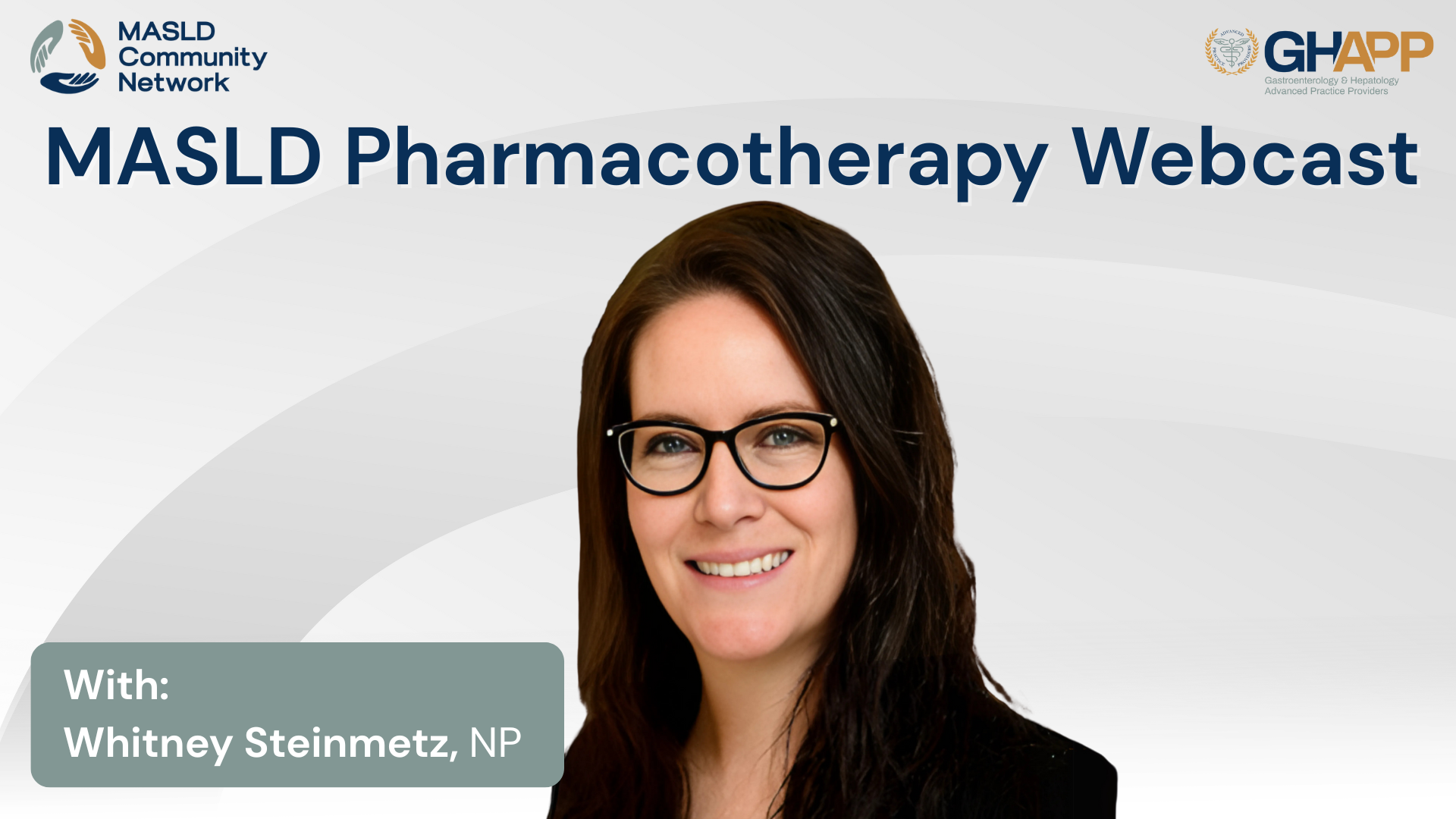
MASLD Pharmacotherapy With Whitney Steinmetz

Join Whitney Steinmetz, NP, from Presbyterian Medical Group in Albuquerque, NM, for an in-depth review of pharmacotherapy in MASLD and MASH, presented as part of the GHAPP MASLD Community Network. In this comprehensive CME-eligible session, Whitney explores the multimodal treatment approach for patients with Metabolic Dysfunction-Associated Steatotic Liver Disease (MASLD) and Metabolic Dysfunction-Associated Steatohepatitis (MASH), focusing on three therapeutic pillars: obesity management, cardiometabolic risk reduction, and liver-directed therapies. The discussion covers mechanisms, clinical trial data, and practical considerations for key treatment options, including GLP-1 receptor agonists, vitamin E, pioglitazone, and resmetirom (Rezdiffra). Whitney highlights findings from landmark studies such as ESSENCE, PIVENS, and MAESTRO-NASH, and explains how thyroid hormone receptor beta activation through resmetirom reduces hepatic fat, inflammation, and fibrosis in F2-F3 patients. She also offers guidance on non-invasive monitoring (FibroScan, MRE, ALT), drug–drug interactions, and how evolving guidelines from AASLD and ESLD shape clinical decision-making. Whether you're treating early-stage fatty liver disease or managing moderate fibrosis in primary care or hepatology, this video provides evidence-based insights to optimize long-term outcomes through targeted pharmacologic strategies and patient-centered care.
Watch Now
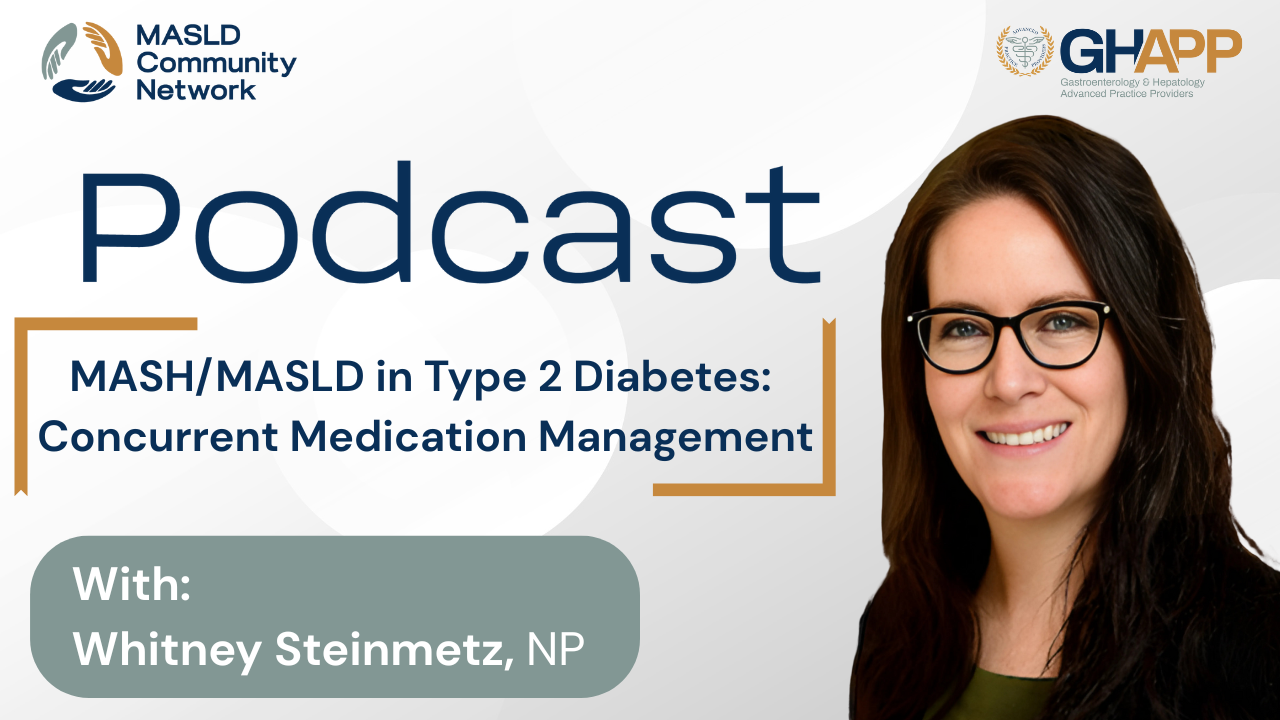
MASH/MASLD in Type 2 Diabetes: Concurrent Medication Management

In this informative episode, Whitney Steinmetz, NP from Presbyterian Medical Group in Albuquerque, NM, explores how to optimize medication strategies for patients with type 2 diabetes who are also living with MASLD and MASH. She discusses why individuals with type 2 diabetes are at significantly higher risk for developing advanced liver fibrosis—highlighting the overlapping metabolic, inflammatory, and insulin-resistant pathways that accelerate liver damage. Whitney breaks down how commonly prescribed diabetes medications—like GLP-1 receptor agonists, SGLT2 inhibitors, TZDs, and dual/triple incretins—impact liver fat, inflammation, and fibrosis progression. She offers practical guidance on selecting therapies that balance glycemic control with hepatic benefits while minimizing polypharmacy. Learn which medications may offer dual cardiometabolic and hepatic advantages, and which should be avoided or used with caution in patients with cirrhosis or advanced fibrosis. Tune in for real-world insights into how advanced practice providers can take ownership of MASH management in diabetes care.
Watch Now
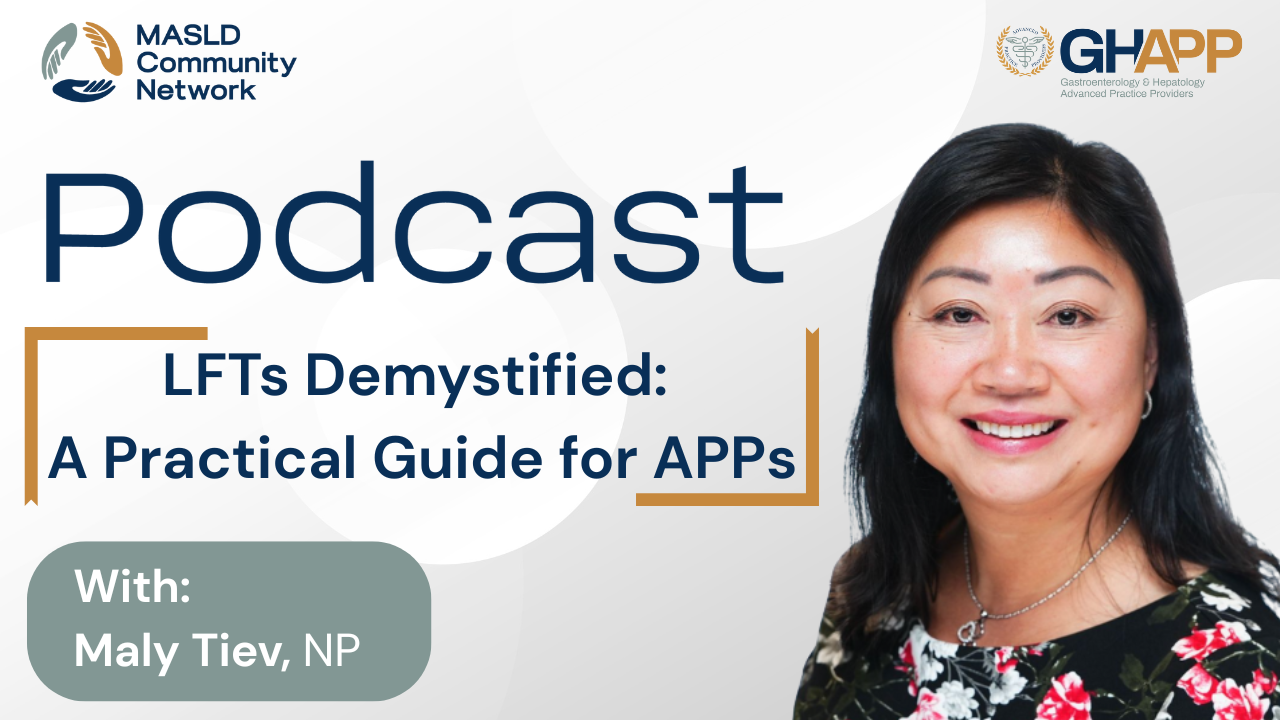
LFTs Demystified: A Practical Guide for APPs

Join Maly Tiev, NP at NYU Langone Health, for this essential educational session on demystifying liver function tests (LFTs), brought to you by the GHAPP MASLD Community Network. In this video, Maly explains how to interpret ALT, AST, alkaline phosphatase, GGT, bilirubin, albumin, INR, and platelet counts in the context of MASLD (Metabolic Dysfunction-Associated Steatotic Liver Disease) and MASH (Metabolic Steatohepatitis). Learn why elevated liver enzymes are not always present in MASH, how to distinguish between different causes of abnormal LFTs—including alcohol-related liver disease, viral hepatitis, and drug-induced liver injury—and how serial LFT monitoring can indicate treatment response or disease progression. Discover the importance of using non-invasive tools for fibrosis risk stratification, the role of platelets as a key marker, and how a deeper understanding of synthetic function tests can help identify cirrhosis earlier. Whether you're a clinician or a patient looking to understand the lab work behind fatty liver disease, this presentation offers practical insights for interpreting LFTs with confidence.
Watch Now

APP Insights: Common Questions from Community GI About MASH

In this video, Lindsay Yoder, PA-C, a hepatology expert at Indiana University in Indianapolis, addresses some of the most common questions general GI providers have about diagnosing and managing MASLD (Metabolic Dysfunction–Associated Steatotic Liver Disease) and MASH (Metabolic Dysfunction–Associated Steatohepatitis). She explains the nuance of interpreting positive autoantibodies like ANA or ASMA, emphasizing that up to 30% of patients with MASLD/MASH may have non-specific reactive antibodies that are not clinically significant for autoimmune hepatitis. Lindsay walks viewers through how to evaluate serologic workups in context—considering IGG levels, ALT trends, and symptoms like fatigue or pruritus—and when to consider liver biopsy. She also shares expert guidance on when to refer patients to hepatology, particularly those with advancing fibrosis (F2-F4) or cirrhosis. Finally, she clarifies how to distinguish between MASLD and alcohol-associated liver disease (ALD), using daily alcohol consumption levels alongside cardiometabolic risk factors to help determine whether a patient falls into a MASLD, ALD, or mixed-etiology category like MetALD. This informative session is essential viewing for clinicians navigating the evolving landscape of metabolic liver disease.
Watch Now
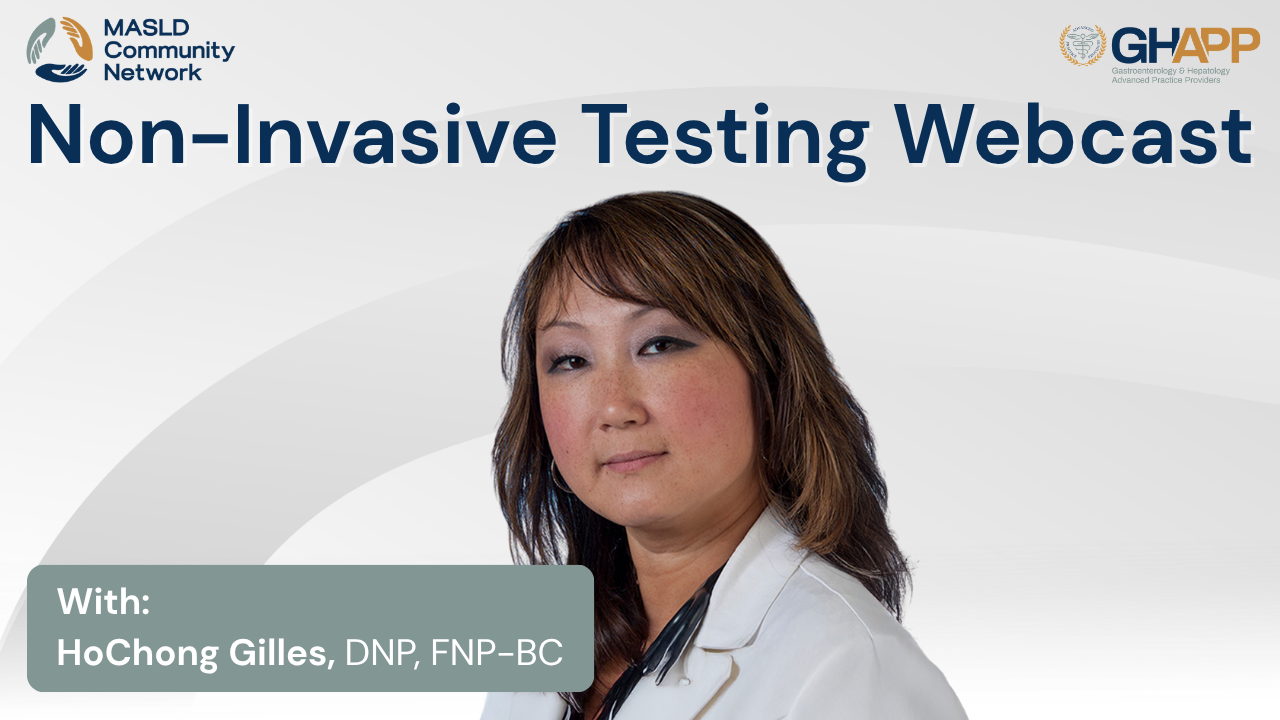
Non-Invasive Testing With HoChong Gilles

In this MASLD Community Network webcast, HoChong Gilles, NP, from the Central Virginia VA Health Care System, provides a comprehensive overview of the evolving role of non-invasive testing (NITs) in diagnosing and staging MASLD and MASH. Using a real-world case example, she demonstrates how tools such as FIB-4, ELF (Enhanced Liver Fibrosis) score, FibroScan (VCTE), MR Elastography, and ultrasound can help clinicians accurately stratify risk, detect significant fibrosis, and avoid unnecessary liver biopsies. HoChong explains the strengths, limitations, and quality considerations of each modality—highlighting how to interpret cut-offs, manage indeterminate results, and incorporate these tests into routine hepatology and GI practice. The session reinforces the importance of combining NIT results with metabolic risk factor management and underscores why accurate staging is essential as new therapies like resmetirom (Rezdiffra) become available for non-cirrhotic patients with F2–F3 fibrosis.
Watch Now
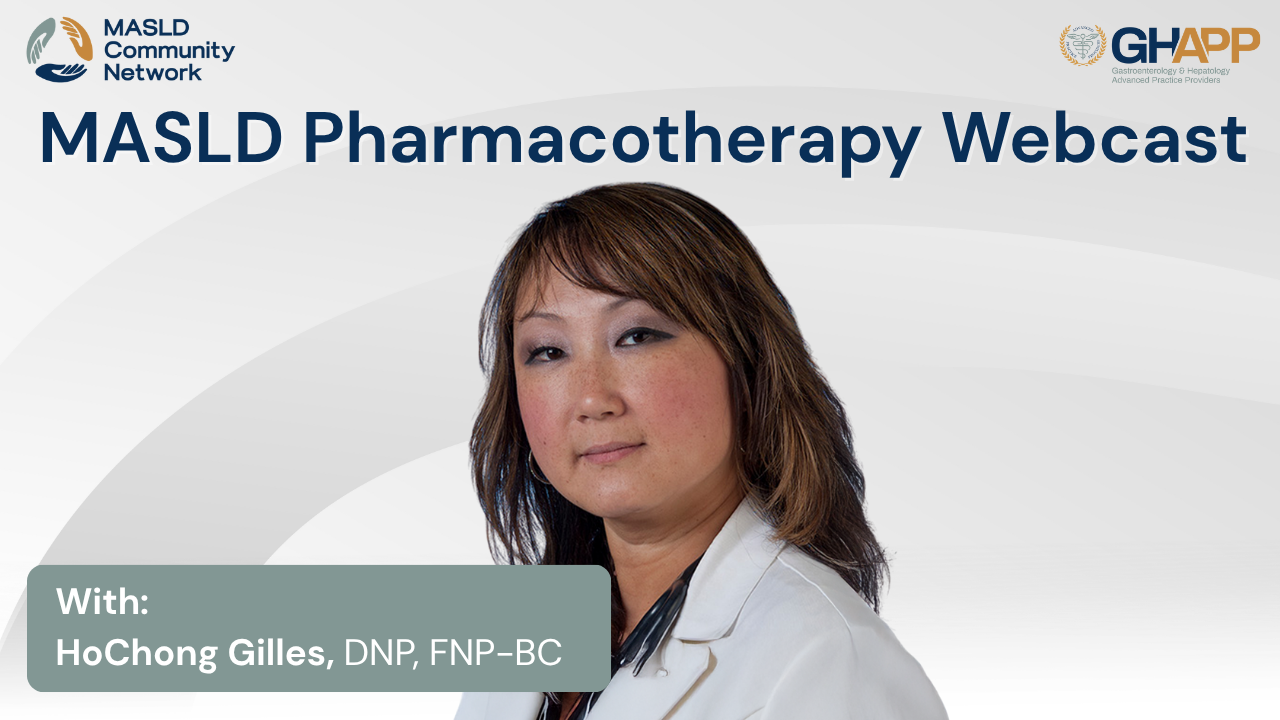
MASLD Pharmacotherapy With HoChong Gilles

In this MASLD Community Network webcast, HoChong Gilles, DNP from the Central Virginia VA Health Care System, provides an in-depth review of pharmacotherapy for MASLD and MASH. The session highlights how management historically focused on lifestyle modification, weight loss, and cardiometabolic risk reduction, and how the treatment landscape shifted in March 2024 with the FDA approval of resmetirom (Rezdiffra)—the first therapy specifically indicated for non-cirrhotic MASH with stage 2–3 fibrosis. HoChong also reviews the evidence and practical use of GLP-1 receptor agonists like semaglutide, including data from the ESSENCE trial, as well as the limited but notable roles of vitamin E and pioglitazone. Key discussion points include drug mechanisms, clinical trial outcomes, real-world safety considerations, drug–drug interactions, and monitoring strategies for patients on therapy. This presentation underscores the importance of integrating lifestyle change with emerging pharmacologic options to improve liver outcomes in patients with MASLD and MASH.
Watch Now
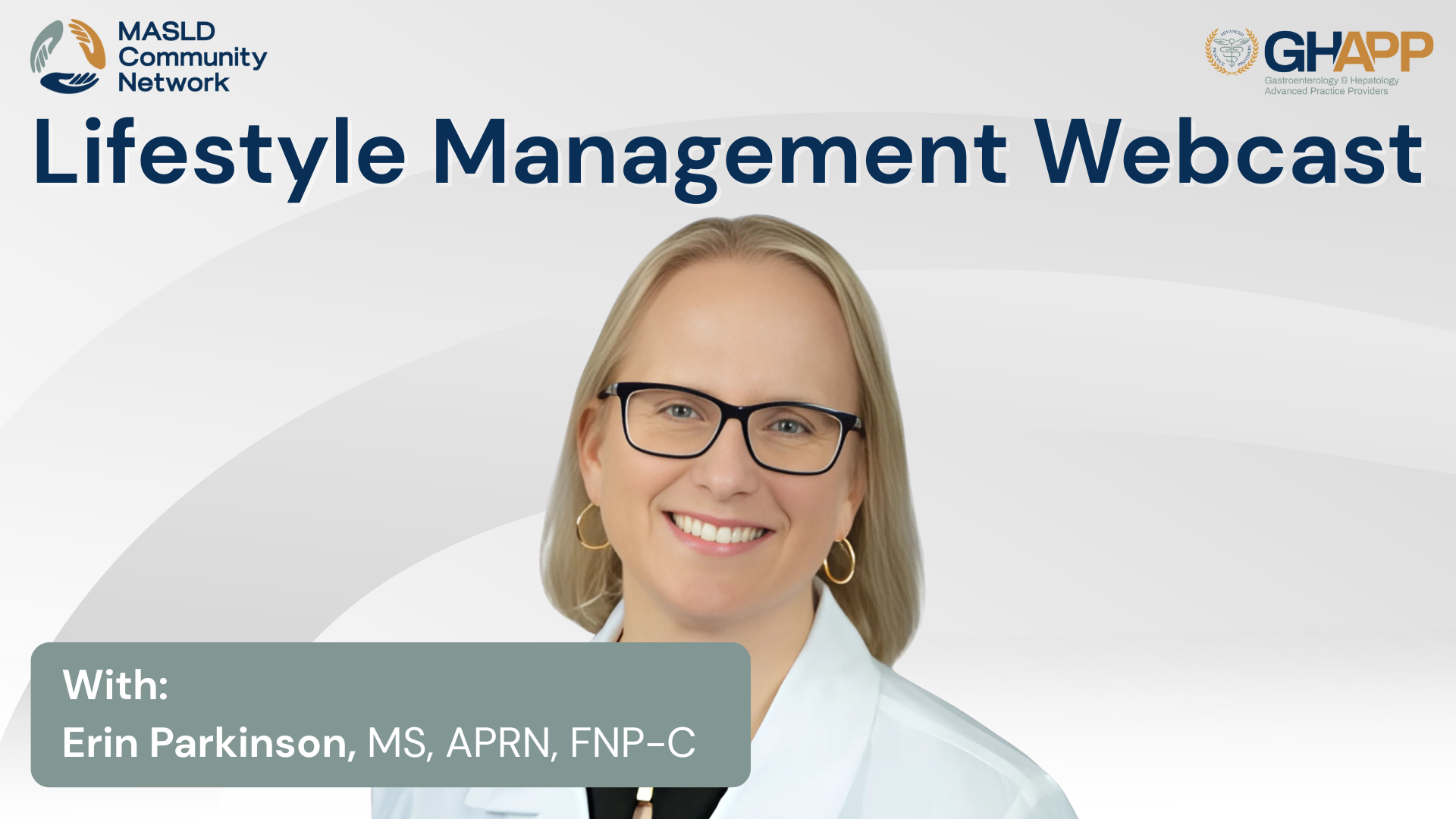
Lifestyle Management With Erin Parkinson

In this impactful session from the GHAPP MASLD Community Network, Erin Parkinson, NP, explores the vital role of lifestyle modifications in the management of MASLD (Metabolic dysfunction-associated steatotic liver disease) and MASH (Metabolic dysfunction-associated steatohepatitis). Through the lens of a real-world case study, Erin illustrates how clinical tools like FIB-4 and FibroScan® can be used to assess fibrosis risk and guide interventions for patients presenting with metabolic syndrome and hepatic steatosis. With a focus on practical, personalized care, this presentation highlights how diet, exercise, and culturally sensitive counseling can meaningfully reduce hepatic fat, inflammation, and fibrosis—key factors in preventing progression to cirrhosis or hepatocellular carcinoma. Erin discusses the impact of processed foods, high-fructose corn syrup, and sedentary behavior, while offering actionable guidance on introducing Mediterranean diets, intermittent fasting, and realistic exercise goals tailored to individual readiness and barriers. Whether you're a hepatology specialist, primary care provider, or obesity medicine clinician, this talk delivers tools to better support patients with MASLD/MASH through sustainable behavioral change and longitudinal follow-up.
Watch Now

APP Insight: Common Questions from Community GI About MASH

In this episode, HoChong Gilles, DNP, FNP-BC, a seasoned hepatology expert and Clinical Program Director at the Central Virginia VA Health Care System, addresses a frequently asked question from primary care and community GI providers: How do you risk stratify patients without access to a FibroScan? Drawing on over 25 years of clinical experience, HoChong outlines practical strategies for assessing liver fibrosis using the FIB-4 score—a simple calculation based on patient age, ALT, AST, and platelet count. She also discusses how tools like the Enhanced Liver Fibrosis (ELF) test, available through Quest or Labcorp, can serve as valuable alternatives in the absence of elastography. Whether you're managing incidental hepatic steatosis or evaluating elevated liver enzymes, this episode offers step-by-step guidance for using non-invasive biomarkers to stratify liver disease risk and guide referrals effectively. Perfect for clinicians in primary care, GI, and hepatology seeking practical, accessible tools for early liver disease assessment.
Watch Now
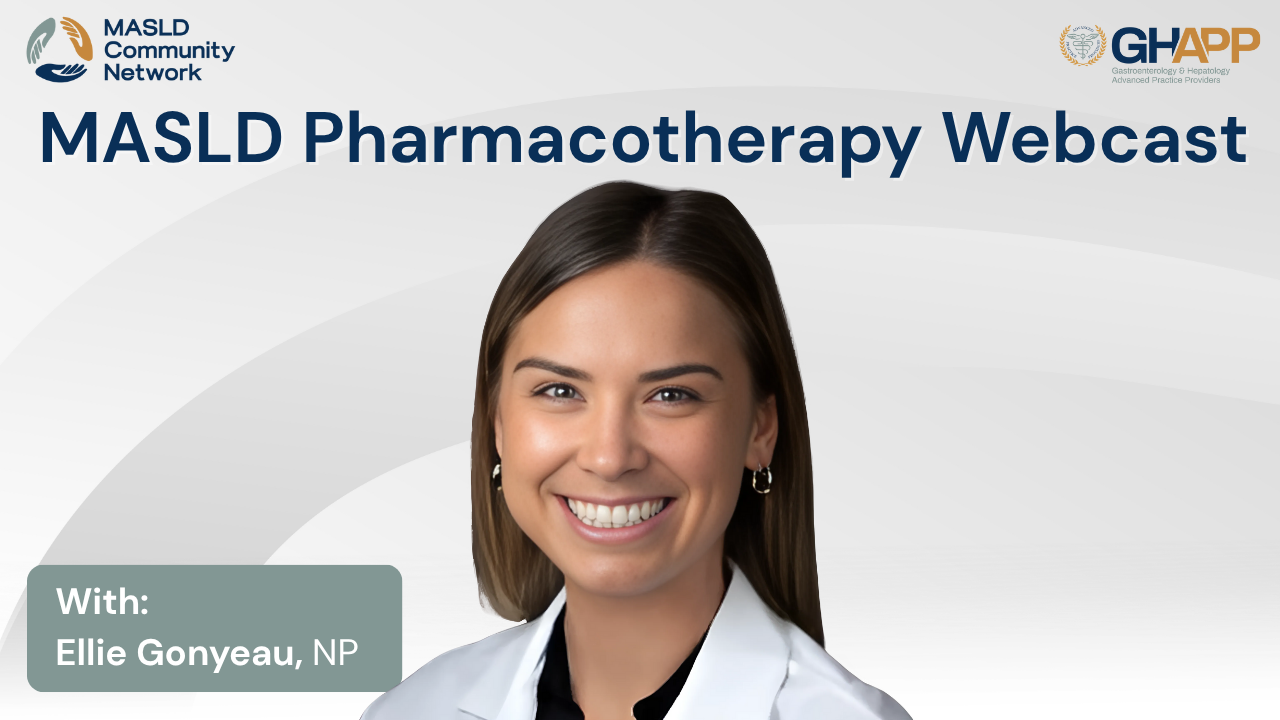
MASLD Pharmacotherapy With Ellie Gonyeau

In this practical, clinician-focused talk, Ellie Gonyeau, NP, walks through a streamlined pharmacotherapy framework for MASLD/MASH—anchored on three pillars: obesity management, cardiometabolic risk reduction (T2D, hypertension, dyslipidemia), and liver-directed therapy. She reviews where GLP-1 receptor agonists fit (weight loss, glycemic control, peri-procedure considerations), summarizes evidence and patient selection for high-dose vitamin E and pioglitazone, and explains the role of resmetirom—the first FDA-approved therapy for non-cirrhotic MASH with F2–F3 fibrosis—its liver-selective THR-β mechanism, pivotal trial outcomes, common AEs, and drug-interaction/ statin considerations. You’ll also learn how to monitor and restage using non-invasive tests (FibroScan kPa/CAP, ELF, labs), set measurable lifestyle goals, and navigate real-world questions around coverage, testing cadence, and treatment duration—so you can confidently tailor therapy and improve outcomes for patients across the MASLD/MASH spectrum.
Watch Now

The Role of Exercise in Liver Health

In this episode, Suzanne Robertazzi, DNP at the Washington DC VA Medical Center, discusses the vital role of exercise in liver health, especially for patients at risk of or living with MASLD (metabolic dysfunction-associated steatotic liver disease) and MASH. With a background in liver transplant care, Suzanne emphasizes the importance of tailoring exercise recommendations to each patient’s abilities, goals, and environment. She outlines practical, empathetic strategies for setting realistic fitness goals, celebrating small milestones, and integrating physical activity with nutritional counseling and behavioral support. Whether it's walking, swimming, or group classes, Suzanne explores low-cost and community-based options for promoting long-term adherence. This episode also highlights the benefits of a multidisciplinary approach, including collaboration with physical therapists, mental health professionals, and dietitians. Packed with actionable insights, this conversation is essential for healthcare providers working to empower patients with fatty liver disease through sustainable lifestyle interventions.
Watch Now





 September 2025
September 2025 